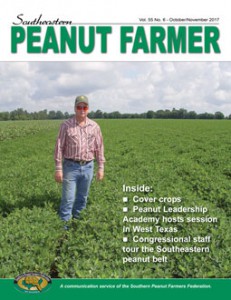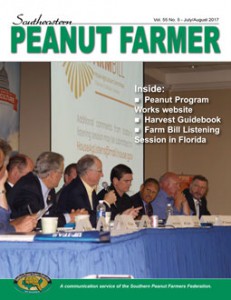U.S. Secretary of Agriculture Sonny Perdue recently announced a slate of Farm Service Agency (FSA) and Rural Development (RD) State Directors, all serving as appointees of President Donald J. Trump. FSA State Directors help implement U.S. Department of Agriculture (USDA) policies in planning, organizing, and administering FSA programs in their respective states. They are also responsible for running the day-to-day activities of the state FSA office. Similarly, RD State Directors work to help improve the economy and quality of life in rural America.
“These state directors will help ensure that USDA is offering the best customer service to our farmers, ranchers, foresters, and agricultural producers across the country,” Secretary Perdue said. “FSA and RD both play a critical role in helping the people of agriculture, and are able to connect with people in their home states. They are the initial points of contact for millions of our USDA customers. Our goal is to help rural America prosper, and these state leaders will be of great assistance in that task.”
The following is a list of State Directors Perdue released in primary peanut growing states:
FSA State Directors:
Alabama: David McCurdy
David McCurdy began his career with USDA in 1987 and has served in various roles throughout the Farm Service Agency. A third generation farmer, David raises cattle, farms soy beans and corn, and also maintains a small timber operation.
Arkansas: David Curtis
David Curtis has worked the past 34 years for Farm Service Agency, serving as the County Director with loan approval authority in North Central Arkansas.
Florida: Neil Combee
Neil Combee currently serves in the Florida House of Representatives and previously served on the Board of Southwest Florida Water Management District and was a Polk County Commissioner.
Georgia: Tas Smith
Tas Smith has been employed at the Georgia Farm Bureau Federation since 2005, with a focus on working with farmers across Georgia to positively shape federal farm policy.
Mississippi: Bobby Carson
Bobby Carson has worked with the National Cotton Council and served as President and Chairman of Cotton Incorporated and the Cotton Foundation, before also serving on the Mississippi FSA State Committee from 2003 thru 2008.
North Carolina: Len McBride
Len McBride began his career with the Farm Service Agency 32 years ago and prior to his appointment he served as a District Director for the FSA based in Statesville, NC.
Oklahoma: Scott Biggs
Scott Biggs is currently a member of the Oklahoma House of Representatives and is well known in the Oklahoma agricultural community for his work to enhance agriculture in the state.
South Carolina: Boone Peeler
Boone Peeler is the Vice President of Harvey Peeler’s Farm, Inc., has been a member of Gaffney, SC city council since 2006, and has worked at the South Carolina Health and Human Services Department.
Texas: Gary Six
Gary Six has been employed by USDA for the past 40 years, while also serving the last 32 years as County Executive Director of Yoakum County.
Virginia: Nivin Elgohary
Nivin Elgohary has served Rural America since she arrived in 1999 at USDA’s Rural Utilities Service and most recently she served as Senior Vice President – Electric, Water, and Community Facilities at CoBank, a national cooperative bank serving America’s rural infrastructure needs.
Rural Development State Directors:
Alabama: Chris Beeker
Chris Beeker grew up on a catfish and cattle farm in the smallest county of his state and through extensive experience of working on the family farm and other business ventures has firsthand knowledge of the positive and important impacts of USDA programs for all communities and especially rural America.
Alaska: Jerry Ward
Jerry Ward is an Athabascan Indian from the Caribou Tribe, born and raised in Alaska, and has a record of public service, including in the U.S. Navy Seabees in Vietnam, as Rural Affairs Coordinator with the Department of Corrections, as Legislative Liaison for the Alaska Energy Authority. He has also served as a member of the State House of Representative, with a seat on the Finance Committee, and in the State Senate as Vice Chairman of the Finance Committee addressing rural Alaska issues.
Arkansas: David Branscum
David Branscum is serving his fourth term in the Arkansas House of Representatives and is a cattleman who has been active with several civic organizations serving to empower rural Arkansas.
Florida: Sydney Gruters
Sydney Gruters has worked for U.S. Representative Vern Buchanan for more than 10 years in an official capacity and has served as the congressman’s liaison regarding all USDA issues that affect rural development.
Georgia: Joyce White
Joyce White served as Chief of Staff in the Georgia Department of Agriculture, was an executive assistant for the CEO of Georgia-Pacific, served the same role in Governor Sonny Perdue’s office, and has focused on helping rural Georgia.
Mississippi: John Rounsaville
John Rounsaville served as State Director for USDA Rural Development in the Administration of President George W. Bush and brings to the Trump Administration two decades of experience in economic and community development, infrastructure planning, and public policy.
North Carolina: Bob Chandler
Bob dedicated his career to agriculture from starting his first internship with USDA in 1974, serving for 35 years, and retiring in 2009. Since 2009, Bob has been Consulting for a Faith based Nonprofit and holding USDA Mediations for the North Carolina Agricultural Mediation Program and Farm Agricultural Resources and Mediation in Virginia.
Oklahoma: Lee Denney
Lee Denney practiced mixed animal practice for 35 years and has served as a member of the Oklahoma House of Representatives and on the Cushing City Commission.
South Carolina: Debbie S. Turbeville
Debbie Turbeville is being promoted to the position of State Director after spending her entire career serving in almost every role at the state level of the agency, having risen in the ranks from the GS-2 level when she started in 1982.
Texas: Edd Hargett
Edd Hargett began working for Electric Cooperatives in 1974 and has served as general manager of both distribution and G&T systems.
Virginia: Elizabeth Walker Green
Elizabeth has been working in Federal and State politics for over thirty years.







